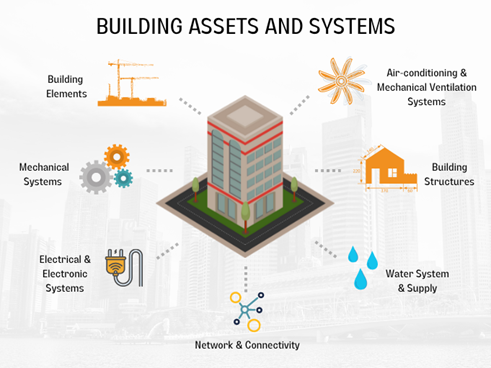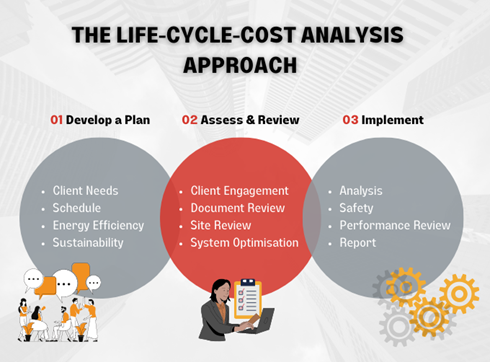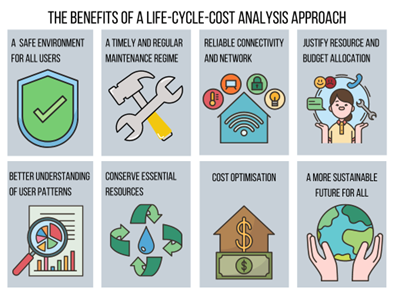Sustainability in Facilities Management: The Life-Cycle-Cost Analysis Approach

What is Life-Cycle-Cost Analysis (LCCA)?
The concept of Sustainability has become increasingly important in our everyday lives as sustainable development helps to protect, preserve and conserve our natural environment for future needs. In the built environment, sustainable buildings not only bring tangible benefits such as a reduction of carbon emissions, energy and water to tenants and owners but also create an economic impact.
Life-cycle-cost analysis (LCCA) is an essential tool when determining budgetary allocations to sustainability implementation strategies. In the context of Facilities Management (FM), the LCCA can be used to plan and budget for the replacement of building assets that have become obsolete and/or reached the end of their economic useful life. The budgeting process involves cost estimation of building assets such as the building, civil and structural elements, and mechanical and electrical systems. Good practices in assessing the projected year of ‘end of life’ involves not only a visual examination of the system or element, but also review of records of past performance and failure trends.

Strategic LCCA Planning Today
While the recent pandemic caused disruption and significantly changed how buildings are occupied and used, considerations relating to the maintenance and demand of building systems for safety and reliability have become ever more critical.
For example, the operation of a typical building system such as an electric transformer continues despite the pandemic and the ensuing reduced occupancy. Its continued operation and usage of result in continuous deterioration and ageing. To upkeep these building systems and equipment, ongoing maintenance programmes are necessary. Many building owners and their facilities managers tend to focus more on the tactical and operational aspects of facilities management, which is short-term. However, as systems and elements have a finite life span, no amount of preventive and proactive maintenance will avoid the need for a life cycle replacement program. Hence, LCCA is essential in strategic facilities management to ensure sound and continued system performance, safety, and reliability.

As a facilities management service provider with a long track record of facilities management services, CPG Facilities Management Pte. Ltd. (CPG FM) understands the importance of the LCCA program. In our experience, we have encountered facilities where such programs are not effectively planned and implemented. Some of the consequences of building owners failing to implement LCCA programs have resulted in system failures, poor durability, and unsafe installations. In addition, dated systems also contribute to high energy consumption.
The planning and effective implementation of LCCA requires a sound understanding of the principles of the lifespan of building systems and elements and the need for timely replacement. Our facilities managers are trained to strategically balance the management of “day-to-day and high-priority” operational tasks with the maintenance or replacement regime of the LCCA. With a sound LCCA programme in place, it will set an appropriate maintenance and replacement schedule that allows building owners to take a preventive approach.
Over the years, CPG FM has supported clients in developing their LCCA plans so that systems and elements can be planned and budgeted for replacement when they reach ‘end of life’.
In the case of one of our clients, the Gardens by the Bay Singapore (GBTB), they had noted a significant increase in maintenance costs to their facilities during the initial five years of their occupancy. They saw a need to implement LCCA and engaged CPG FM with a LCCA Consultancy contract in 2018.
For this Consultancy contract, the scope covered all systems and elements to the buildings as well as the sizeable garden spaces in the premises of the Gardens by the Bay. Data collection and a thorough review of all systems and elements was conducted and engagement sessions were held with GBTB to address their concerns. Systemic site observations were conducted by our multidisciplinary consultants, to assess and ascertain the remaining years of useful economic life. At the end of the exercise, a comprehensive report covering our findings and recommendations for the LCCA programme was developed and submitted.
The LCCA programme that CPG FM developed for GBTB detailed two phases - the first phase covered Years 1 to 10 and the second phase from Years 11 to 20. CPG FM continues to engage with GBTB to ensure that the LCCA contract is progressing well and in line with the project schedule.
Having implemented our recommendations, GBTB was able to manage its building assets strategically and optimise its costs; while having the necessary information on hand to budget for and allocate resources appropriately for the long-term sustainability of its buildings and facilities.
A data-driven and analytics-powered approach
Where possible, facilities managers should lean on technology for a data-driven and analytics-powered approach. Doing so would allow facilities managers to make meaningful interpretations to plan a maintenance regime, rationalise costs and allocate budget. In addition, digitalisation offers opportunities for a more streamlined process flow. Automating the process of LCCA also allows for integration of data from other IT platforms such as Computer aided FM systems, Building Information and Building automation systems.

Another key benefit of a data-driven approach is that findings can be used to justify budget approval to implement the replacement of building systems, as well as predict the resources and manpower towards that will be required for future maintenance or replacement exercises.
Challenges in adopting a LCCA Programme
In all projects, balancing the competing demands of the operational side of FM with the strategic outcome that LCCA provides is always a challenge. For example, it may be difficult to implement LCCA after the complete programme has been developed due to possible time constraints, operational and functional needs, and manpower resources. In some instances, building systems that are not correctly replaced result in poor reliability and an unsafe environment.
The second challenge is data gathering. Such data includes inventory information such as the make, model, capacity, and quantities. All this information will be relevant for a reasonable estimation of the replacement costs of the building assets that are fundamental to LCCA. However, sometimes historical data are not presented, or records are incomplete or missing. In such situations, facilities managers need to hold engagement sessions to understand, evaluate and interpret the data meaningfully.
Thirdly, as LCCA is also a financial exercise, projecting indicators such as inflation can pose a challenge as one cannot predict exact inflation rates accurately. That said, we are still able to give an estimate through the study of past inflation data and historical trends.
The fourth challenge is in determining the lifespan of systems and elements. Whilst there are published guides that give the estimated life span of systems and components, the final call for the recommended life span for a particular building asset had to be based on actual conditions and its past performance in the respective buildings.
Conclusion
Implementing the LCCA approach may come with its challenges, however, considering the long-term benefits LCCA can bring for maintenance and resource conservation, it is a good option to consider. Working with experienced FM companies will ensure that the planning and execution of the LCCA programme can achieve the benefits it sets out to attain, so that stakeholders can enjoy continued comfort, reliability, connectivity, and a safe environment. As we reach for a sustainable future, let’s continue working collectively to understand and take meaningful action to protect and maintain the built environment around us.
This article was authored by:
 | Leslie Earnest, Principal Consultant |



